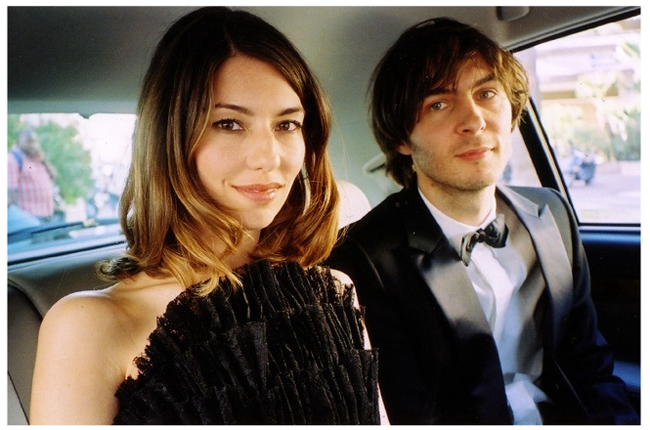It comes as little surprise to learn that Sofia Coppola, a filmmaker for whom music often plays a scene-stealing role, enlisted Phoenix, the French rock band fronted by her boyfriend Thomas Mars, to score her new film, “Somewhere.” What is surprising, however, is that the creative collaboration between the couple, who now have two young daughters together, started before they’d even met in person.
In 1999 Mars was brought in by his friends in the band Air to lay down test vocals for the final song on their soundtrack for Coppola’s “The Virgin Suicides,” which would be sung by David Bowie. Inspired by the film’s imagery, Mars wrote and recorded the lyrics to “Playground Love,” and suddenly Mr. Bowie was out of a job.
“I was really happy when I heard it,” recalls Coppola. “It’s romantic, and the perfect feeling for that moment.”
The Phoenix track “Too Young” popped up in Coppola’s next film, “Lost in Translation,” in a party scene while Scarlett Johanssen and Bill Murray’s characters are out on the Tokyo town. As Mars observes, “It’s sort of the best music video you could have: everybody dancing to your song in a film.”
Still, the two didn’t get together until Coppola moved to Paris after divorcing director Spike Jonze. By the time shooting began on “Marie Antoinette” in 2006 Coppola and Mars were a couple, and Phoenix did a memorable cameo as the court musicians entertaining Kirsten Dunst’s young queen with the song “Ou Boivent les Loups,” fully costumed in wigs and waistcoats.
For the Versailles-bred band, the experience was doubly surreal. “When we were teenagers we used to play in our basement that was across the street,” says Mars, remembering games of laser tag on the grounds at night. “If you’re a kid in Versailles, it’s your castle.”
As a kid in Hollywood, Coppola played on the grounds of another castle: the Chateau Marmont, and it’s here that “Somewhere” is set. In its overall look and feel, this understated story of empty celebrity and a father-daughter bond is the antithesis of the candy-coated rococo explosion that is “Marie Antoinette,” and the music follows suit.
“I was kind of sick of movies that are just bombarded with pop songs as a score — which i’ve been guilty of,” says Coppola. “We tried to keep it really minimal. I didn’t want to have scenes where the emotional underline was done by the music.”
Her discussions with Phoenix began with the ambient electronic sounds of Brian Eno and Giorgio Moroder’s score for “American Gigolo,” in which “there would just be a tone going through something.”
Coppola was especially taken with the band’s song “Love Like a Sunset,” from their Grammy-winning album “Wolfgang Amadeus Phoenix,” and this two-part, mostly instrumental composition provided the film’s de facto score.
“We just created a theme around parts and pieces of that song,” Mars explains. “It’s not even a score; it’s maybe 77 seconds of music which is basically keyboards getting in and out of tune.”
In the opening, the sound of the Stephen Dorff character’s Ferrari seamlessly segues into the the title sequence as he drives back to the Chateau Marmont. While the “Sunset” of the song’s title doesn’t actually refer to Sunset Blvd., Mars reveals that there’s an indirect connection. “Sofia loves Ed Ruscha,” he says of the famed L.A. artist, “and she got me into him. You know how certain artists are so clever that you want them to realize your fantasies in a way? I always pictured him painting these words, ‘love like a sunset.’…So there’s a link somewhere.”
At certain points it’s hard to tell if you’re just hearing the atmospheric sounds of the city but Coppola confirms that this is, in fact, the score. “It’s just sort of barely there but it kind of puts [Dorff] in his own world.”



